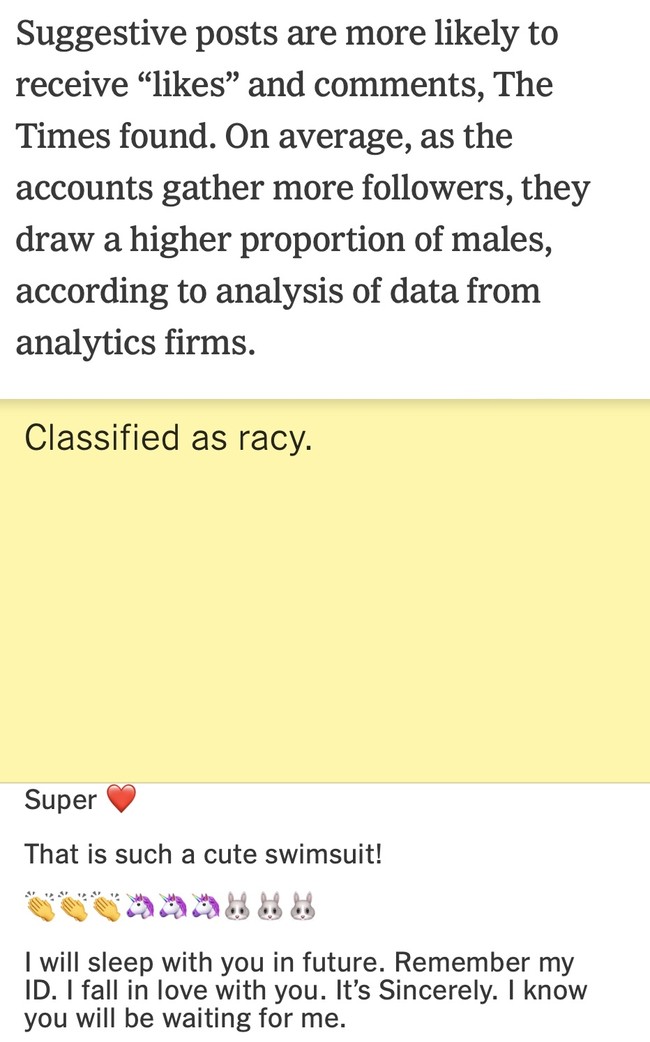Meta/Facebook/Instagram has knowingly been facilitating child predators purchasing sexualized content from children and they decided to do nothing to stop it.
After all, there is real money to be made selling sexualized images to kids. Money for the kids, their moms, and for Instagram.
New York Times too https://t.co/7pV8GfQpRl
— Elon Musk (@elonmusk) February 24, 2024
Both the New York Times and The Wall Street Journal published stories this weekend on Instagram's conscious decision to promote a feature that connects pedophiles to children posting racy content. None of the content appears to be actual kiddie porn with nudity and sexual acts, but it is softcore pornography and can include explicit sexual text messaging between children and the predators.
Meta Platforms META -0.43%decrease; red down pointing triangle safety staff warned last year that new paid subscription tools on Facebook and Instagram were being misused by adults seeking to profit from exploiting their own children.
Two teams inside Meta raised alarms in internal reports, after finding that hundreds of what the company calls “parent-managed minor accounts” were using the subscription feature to sell exclusive content not available to nonpaying followers. The content, often featuring young girls in bikinis and leotards, was sold to an audience that was overwhelmingly male and often overt about sexual interest in the children in comments on posts or when they communicated with the parents, according to people familiar with the investigations, which determined that the payments feature was launched without basic child-safety protections.
While the images of the girls didn’t involve nudity or other illegal content, Meta’s staffers found evidence that some parents understood they were producing content for other adults’ sexual gratification. Sometimes parents engaged in sexual banter about their own children or had their daughters interact with subscribers’ sexual messages.
First of all, ewwwww.
Second, employees blew the whistle on the problem and proposed solutions to it, but Meta rejected the suggestions and expanded the program. They instead created a program to seek out and prevent pedophiles from subscribing to child-centered content, but the system was porous, and was easily circumvented.
The Wall Street Journal story was pretty good at laying out the problems and Instagram/Meta's relaxed view of child sexualization, The New York Times' story was an order of magnitude more informative and hard hitting. (Yes, I said that. Credit where credit is due, and the story is excellent). They dove into story, talked to the moms who managed these accounts, and while not providing actual racy photographs (think American Apparral ads from their pedophile-adjacent phase of advertising), they show how the photos are categorized and how the buyers were lured in.
I highly recommend the story, although it is behind a paywall I assume. I subscribe for obvious reasons.
Thousands of accounts examined by The Times offer disturbing insights into how social media is reshaping childhood, especially for girls, with direct parental encouragement and involvement. Some parents are the driving force behind the sale of photos, exclusive chat sessions and even the girls’ worn leotards and cheer outfits to mostly unknown followers. The most devoted customers spend thousands of dollars nurturing the underage relationships.
The large audiences boosted by men can benefit the families, The Times found. The bigger followings look impressive to brands and bolster chances of getting discounts, products and other financial incentives, and the accounts themselves are rewarded by Instagram’s algorithm with greater visibility on the platform, which in turn attracts more followers.
One calculation performed by an audience demographics firm found 32 million connections to male followers among the 5,000 accounts examined by The Times.
Interacting with the men opens the door to abuse. Some flatter, bully and blackmail girls and their parents to get racier and racier images. The Times monitored separate exchanges on Telegram, the messaging app, where men openly fantasize about sexually abusing the children they follow on Instagram and extol the platform for making the images so readily available.
“It’s like a candy store 😍😍😍,” one of them wrote. “God bless instamoms 🙌,” wrote another.
None of this would be happening without the participation of the parents, who are exploiting their children for financial gain.
As amazing as that sounds, parents are doing worse to their children and getting praised for it. Transing their children, for instance. If parents can get their little girls' breasts removed and announce their sexual preferences while still prepubescent, should it suprise us that they are using their children to make a quick buck?
I guess we now know why that porn has to be in schools. It is job training.
“I really don’t want my child exploited on the internet,” said Kaelyn, a mother in Melbourne, Australia, who like Elissa and many other parents interviewed by The Times agreed to be identified only by a middle name to protect the privacy of her child.
“But she’s been doing this so long now,” she said. “Her numbers are so big. What do we do? Just stop it and walk away?”
What do we do?
STOP IT AND GET YOUR HEAD EXAMINED! Protect your child!

Instagram moms are perhaps the biggest villains in this whole story, but Meta knowingly created and fostered the market, expanded it when the revenue started rolling in, and made sure the returns for the moms and kids were high enough to keep the program expanding.
It's not quite YouP*rn for pedos, but then again it's not that far off.
Kaelyn, whose daughter is now 17, said she worried that a childhood spent sporting bikinis online for adult men had scarred her.
“She’s written herself off and decided that the only way she’s going to have a future is to make a mint on OnlyFans,” she said, referring to a website that allows users to sell adult content to subscribers. “She has way more than that to offer.”
She warned mothers not to make their children social media influencers. “With the wisdom and knowledge I have now, if I could go back, I definitely wouldn’t do it,” she said. “I’ve been stupidly, naïvely, feeding a pack of monsters, and the regret is huge.”
How naive could she be? Not that naive, I would bet. She may have regrets but she knew she was feeding the monsters, just as Mark Zuckerberg does.
Account owners who report explicit images or potential predators to Instagram are typically met with silence or indifference, and those who block many abusers have seen their own accounts’ ability to use certain features limited, according to the interviews and documents. In the course of eight months, The Times made over 50 reports of its own about questionable material and received only one response.
Meta, Instagram’s parent company, found that 500,000 child Instagram accounts had “inappropriate” interactions every day, according to an internal study in 2020 quoted in legal proceedings.
In a statement to The Times, Andy Stone, a Meta spokesman, said that parents were responsible for the accounts and their content and could delete them anytime.
“Anyone on Instagram can control who is able to tag, mention or message them, as well as who can comment on their account,” Mr. Stone added, noting a feature that allows parents to ban comments with certain words. “On top of that, we prevent accounts exhibiting potentially suspicious behavior from using our monetization tools, and we plan to limit such accounts from accessing subscription content.”
There are so many striking aspects to this story, but there is one in particular I want to emphasize. There is a reason Elon Musk tweeted these stories out: there has been a multi-year campaign to demonetize Twitter/X based on the claim that is promotes "unsafe" content, meaning speech that people who are Left-of-center don't like.
That campaign has worked to a great degree. Very little money from big corporations go to advertising on Twitter/X.
That money has flowed, instead, to platforms like Facebook, Instagram, and TikTok, where child sexual exploitation content is everywhere.
Censorship advocates are determined to shut down Musk's free speech platform, which until he bought it was also filled with child sexual exploitation material, which Musk kicked off the platform. The advertisers were fine with that, but having President Trump and the Babylon Bee allowed back on the platform was a bridge too far.
The big ad platforms have consciously chosen to support child sexual exploitation.
But they want to make the internet safe for Marxists.








Join the conversation as a VIP Member